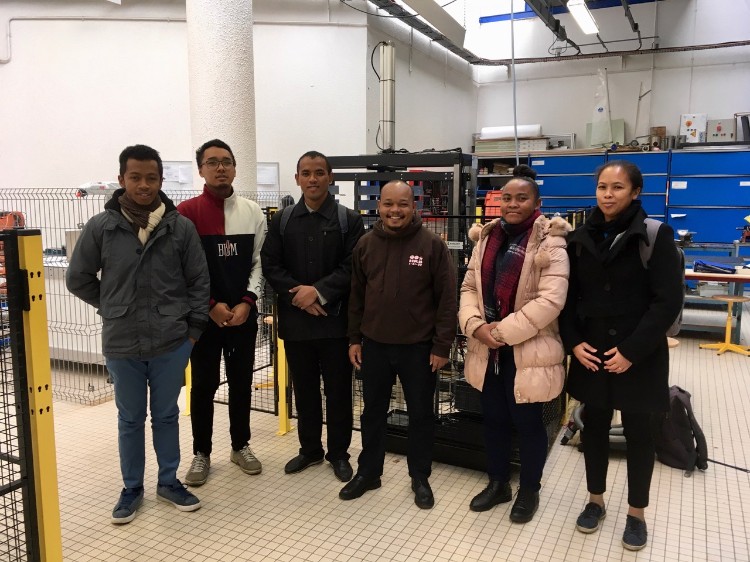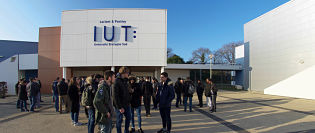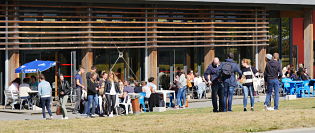International projets
International projects
University International Cooperation and Humanitarian Aid Network (UNICAH)
The overall objective of the UNICAH PROJECT is to create and strengthen a collaborative International University Network including partner institutions, which share the mission of promoting solidarity and humanitarian values among their universities communities.
Specifically the project aims at preparing competitive professionals of the humanitarian sector able to implement change-making processes towards a more inclusive, respectful and fair global society, and fostering research and innovation in the field of international cooperation for the humanitarian professional sector.
The project is financed by the European Commission in the framework of the Erasmus+ Program and its Key Action 2 for Strategic Partnership in the Field of High Education 2015.
Read more: http://unicah.ulpgc.es/
PONCHO
The PONCHO Consortium is composed of 4 European Union (EU) universities from 4 different EU countries (Spain, France, Portugal and Poland) and 21 universities from 8 Latin America (LA) countries (Argentina, Bolivia, Brazil, Colombia, Ecuador, Paraguay, Peru and Uruguay). The specificity and innovative aspects of the PONCHO Consortium is that it is mainly composed by small universities, geographically located in peripheral areas and with no or a few experience in EU and Capacity Building projects (Alfa projects) for the Latin American partners.
Read more: http://poncho.ulpgc.es/#aboutus
ARCADIA Project
The ARCADIA Project is one of 17 projects funded by the French Ministry for Europe and Foreign Affairs with the first call for projects pertaining to Support for the Development of Tertiary Education in Africa.
The Arcadia project was in competition with 200 other project proposals.
This French national project aims to build capacity in industrial engineering within the Higher Institutes of Technology of Antananarivo and of Antsiranana in the Democratic Republic of Madagascar. It is also trying to enrich the range of pedagogical approaches and aims to look at establishing a joint engineering degree.
Two Madagascan Food Companies are also involved, one being La Star brewery and the other Refrigepeche Group a Fish and Seafood food processing and distributing company.
The Arcadia project started in May 2019 and will end in April 2021.
The project is critical to Madagascar Food Security policy, and is a priority as the country seeks to improve its food production, storage and transformation, through better equipment and maintenance.
Lorient University Institute of Technology hosted 4 Madagascan colleagues from these two institutions in November and December 2019.
Three Departments from the Lorient Institute of Technology i.e.
- Quality, Industrial Logistics and Organisation (QLIO)
- Thermal and Energy Engineering (GTE) and Industrial
- And Maintenance Engineering (GIM)
hosted the Madagascan colleagues who came to reinforce their existing capacities in Industrial Engineering and also work on innovative pedagogical methods with the UBS Pedagogical Support Services.

During their stay they also had the opportunity to exchange with their former students studying at UBS and to check with them what difficulties they are encountering and what could be put in place to improve their integration into the French education system.
43 Madagascan students are indeed enrolled at UBS this year and most of them actually come for Antananarivo Higher Institute of Technology!
Tahina RAKOTOARIVONY, head of the Accounting and Finance study stream at Antananarivo (IST-T) was hosted by QLIO from Nov 12th to Nov 20th 2019. Her study trip allowed her to discover various forms of “active” pedagogies such as game-based learning. She would like to adapt the Kanban management game with her students to reinforce their skills in Supply Chain and Lean Management.
André RAKOTONIRINA, Head of the Refrigerating and Thermal Equipment Maintenance study stream at Antsiranana/ Diego-Suarez (IST-D) integrated the GTE Department between Nov 19th and Dec 16th 2019. During his stay André used a skill- based approach to define learning outcomes expected in a “Cold System Energy Exploitation and Maintenance” module.
The GIM department hosted Milasoa FANAMPISOA BEATRICE (Teacher at IST-D) and Maharo RAKOTOARIAMANANA (teacher at l’IST-T) 25th to Dec 18th 2019. Both also adopted a skill-based approach to refine the learning outcomes expected for their respective students in “Design, Maintenance and Programming of Electrical, Electronic and Automated Systems”.
Our 4 colleagues went back to their home institutions with new ideas, a desire to develop new pedagogical frameworks and a desire to reinforce future research and teaching collaborations with their UBS hosts for whom this was also a very enriching inter-cultural experience.



